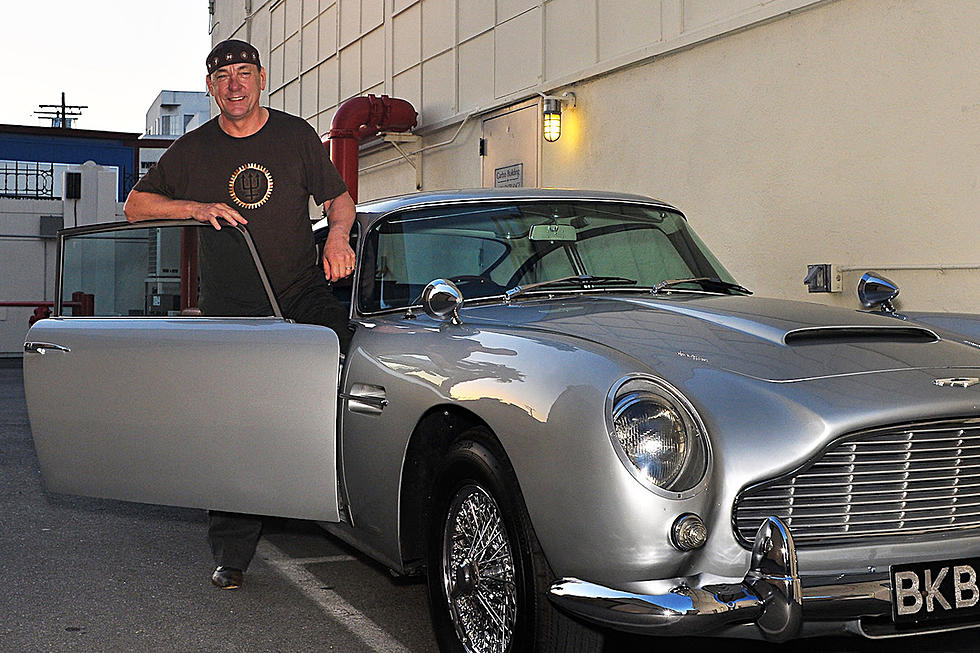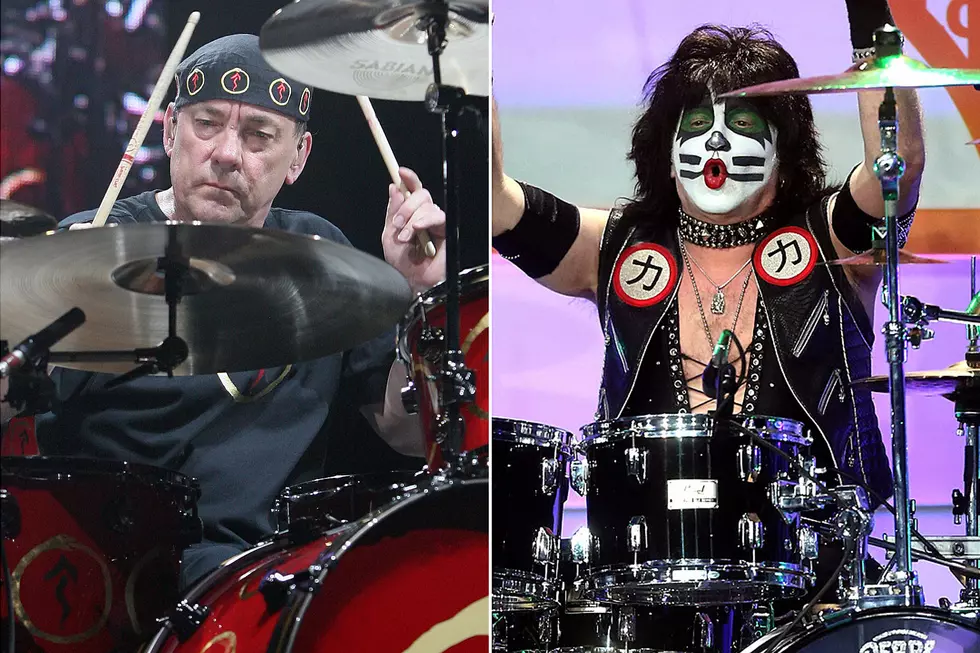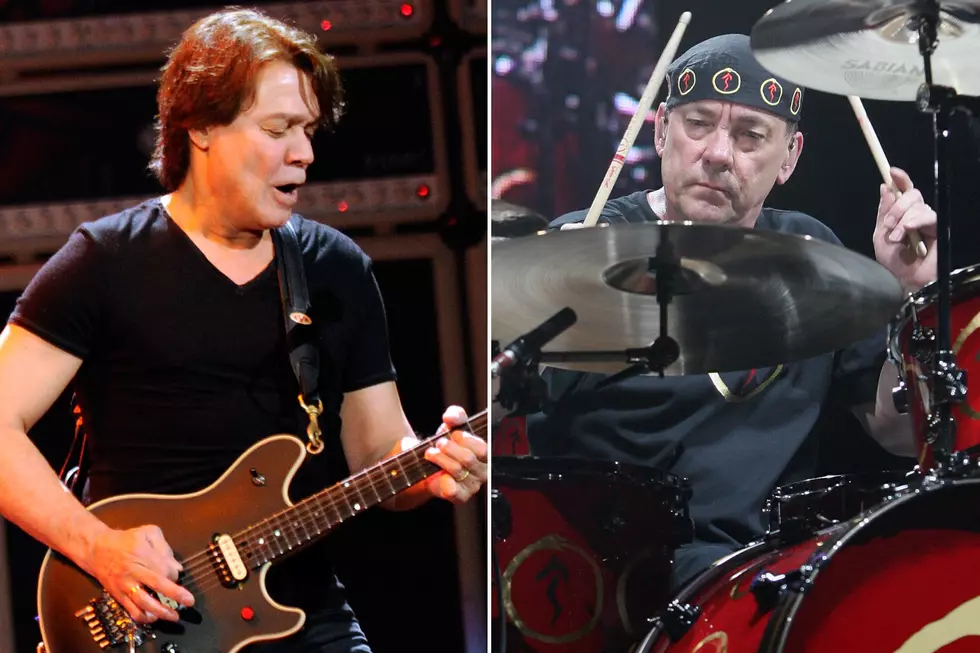
Neil Peart: Family Man
Throughout his storied life, late Rush drummer Neil Peart retained his family values. He had good reason – from an upbringing that included supportive, caring parents, he fought through the loss of his wife and daughter within 10 months of each other to find himself settled again with a new wife and daughter.
Often regarded as the “professor” of progressive rock, Peart valued the merits of remaining a student of his art, and it seems as if his appreciation of learning was instilled in him early, as his mom Betty and dad Glenn brought him up in an environment of encouragement.
Realizing that their son (the eldest of four children) had a burning ambition to play drums, they bought him lessons for his 13th birthday on Sept. 12, 1965. “No drums, you understand, just a pair of sticks and a practice pad,” Peart wrote in 2015. “Every Saturday morning I would catch the bus to downtown St. Catharines [in Ontario] for a lesson with Don George at the Peninsula Conservatory of Music on St. Paul Street. Even there I wasn't playing drums. … An arrangement of metal-rimmed pads mimicked the layout of a four-piece set.” He recalled learning his rudiments in “a combination of thuds and clicks"; and George later told him that he was capable of becoming a drummer if he really wanted to. “That meant a lot,” he said.
After proving to his parents that he was going to stick at it, they bought him a basic $150 kit for his 14th birthday. “Every afternoon after school I played along with the pink speckle AM radio on the steam radiator beside me," he said. “Whatever song came on the Top 40 station, I tried to play along. Next, Mom and Dad got me a hi-hat, then a floor tom, and I saved up paper-route and lawn-mowing money for a pair of Ajax cymbals.”
The family circle continued to play an important role in Peart’s life – he went to work in his dad’s farm equipment dealership. Glenn Peart recalled the situation a “perfect fit,” though it was clear that “Neil had only one burning passion — to be a drummer! He had several local gigs and some local success, but he was disgusted that the other band members did not share his passion.” At the age of 18, Glenn and Betty realized “all the music that Neil wanted to play was coming out of England” and that a move was on the cards. “We talked it over and he would be working with me for the summer. I said whatever he could save up, I would double,” Glenn said.
Peart spent four years in London, failing to find the success he was looking for. His parents visited him in 1973 and offered him a full-time role in the family business; he returned to Canada the following year. “He slipped into the position quite comfortably,” Glenn recalled. “Neil had joined a small local band playing only on weekends. ... Somehow, his reputation had gotten around.”
Peart’s family loyalty almost derailed his career hopes when he was invited to leave his current group, Hush, and join Geddy Lee and Alex LIfeson in Rush, later in 1974. After a white Corvette arrived at the dealership and the band’s managers said they’d like him to become part of the trio, Glenn noted that his son seemed “really tormented."
“Neil was consumed with guilt because we were just coming into our busy season and he felt he was letting me down," his dad noted. "I finally said, ‘Neil, this could be the chance of your life. We have to talk this over your mother when we get home, but I feel you have to do this. It could be a dream come true and if it doesn't work out, there will still be a parts department that can use you!’ Obviously, Mom agreed with my thoughts and the rest is history!”
Peart began to form his own family when he settled down with Jacqueline Taylor around the time he joined Rush. Their daughter Selena was born in 1978. The family unit was ripped apart by a pair of tragedies the drummer always believed was connected. In August 1997, Selena was killed in a motor accident, leading to Jacqueline suffering an effective breakdown. “It soon became apparent that Jackie's world was completely shattered forever. She had fallen to pieces, and she never came back together again,” he wrote in his 2002 book Ghost Rider: Travels on the Healing Road. “And neither did the two of us, really, though I tried to do everything I could for her.
"As my life suddenly forced me to learn more than anyone ever wanted to know about grief and bereavement, I learned the sad fact that most couples do not stay together after losing a child. Outrageous! So wrong, so unfair, so cruel, to heap more pain and injustice on those who had suffered so much already. In my blissful ignorance, I would have imagined the opposite – that those who most shared the loss would cling to each other. But no. … She wouldn't let me comfort her, and didn't want anything to do with me, really. It was as though she knew she needed me, but her tortured heart had no place in it for me or anybody. If she couldn't have Selena, she no longer wanted anything -- she just wanted to die.”
Ten months later, that’s exactly what happened. “Jackie was diagnosed with terminal cancer (the doctors called it cancer, but of course it was a broken heart), and a second nightmare began,” Peart wrote. “After months of misery, despair and anger (often directed at me, as the handiest ‘object’), she never uttered a harsh word after that diagnosis, and rarely even cried. To her, the illness was a terrible kind of justice. To me, however, it was simply terrible. And unbearable.” She died while the couple was on vacation in Barbados – the location of their last holiday with Selena – where “a series of strokes brought a relatively merciful end” to her life.
That left family man Peart without a family. At Selena’s funeral he told Lee and Lifeson, “Consider me retired,” and after Jacqueline’s death he found himself with no focus in life. “I remember thinking, ‘How does anyone survive something like this? And if they do, what kind of person comes out the other end?’” he wrote. “I didn't know, but throughout that dark time of grief, sorrow, desolation and complete despair, something in me seemed determined to carry on. Something would come up.”
He took off from the family’s mountain home – his “sanctuary” – on his touring motorcycle, and in the end traveled 55,000 miles as he tried to make sense of himself once again. One key moment came when he discovered a postcard depicting a cloud formation called a “ghost rider.” “I stopped, my head jerked back, and I thought, ‘Whoa, yeah! – I am the ghost rider!’" he recalled. "The phantoms I carried with me, the way the world and other people's lives seemed insubstantial and unreal, and the way I myself felt alienated, disintegrated and unengaged with life around me. ‘Oh yes,’ I thought, 'That's me all right. I am the ghost rider.'"
Later on his travels, Rush photographer Andrew McNaughton introduced Peart to his assistant, Carrier Nuttall, with the intention of matchmaking. The drummer resisted until, after a handful of meetings, “I saw her across the proverbial crowded room and fell. That was in late 1999, and the following September, Andrew was an usher at our wedding in Santa Barbara, and gave a sweet speech as our ‘benefactor.'” After McNaughton died, Peart noted that "introducing me to Carrie was a life-changing gift.”
Finding himself in a better state of mind, Peart returned to work with Rush and even adopted a new approach to his drumming after finding himself disillusioned with his own abilities. The result was an entirely different technique that he later equated to athletic performance and contributed somewhat to hie decision to retire around 2015.
Another big reason was his family values. By that time, he and Carrie had a daughter, Olivia, and he’d become aware that the duties of being a member of Rush clashed with his interpretation of the duties of being a father. “I've been doing this for 40 years — I know how to compartmentalize, and I can stand missing her, but I can't stand her missing me,” he said in 2015. "It’s painful and impossible to understand for her. How can a small child process that? And there's the guilt that comes with that — you feel guilty about it, of course. I'm causing pain.”
That was the point when he noted that his then-six-year-old daughter began describing him as “a retired drummer.” “True to say – funny to hear," he argued. "And it does not pain me to realize that, like all athletes, there comes a time to … take yourself out of the game.” It’s now believed he had been diagnosed with the brain cancer that eventually took his life in January 2020 at the age of 67. That diagnosis presumably increased his determination to spend as much time with his family as he could.
Then there’s Peart’s additional family: Lee and Lifeson, who, in a joint statement confirming his death, described him as their “soul brother.” At the time of his retirement, Peart reflected, "Forty-one years with one band – three young guys who grew up together in music and in life, going through everything music and life can throw at you. All the while, we were doing what we wanted, the way we wanted to do it. That's the quality I'm most proud of, really – just that we can stand as an example, in the face of what often seems like a factory of corporate entertainment. If nothing else, we showed that it is possible to make a career of music without giving away – or selling – your soul."
In one of his last interviews, Peart discussed his personal values. "Honestly, people don’t realize the sacrifice you make as a touring musician,” he told Classic Rock in 2017. "Being away when children are growing up and when your partner needs you around, it’s wrenching. Your family and friends, their lives continue and you’re not part of them. People don’t place enough value on family life. It’s too easy to get caught up in the tedious day-to-day stuff and miss the miracle that’s unfolding before you."
Neil Peart Through the Years: 1976-2015 Photo Gallery
More From 101.9 KING-FM










